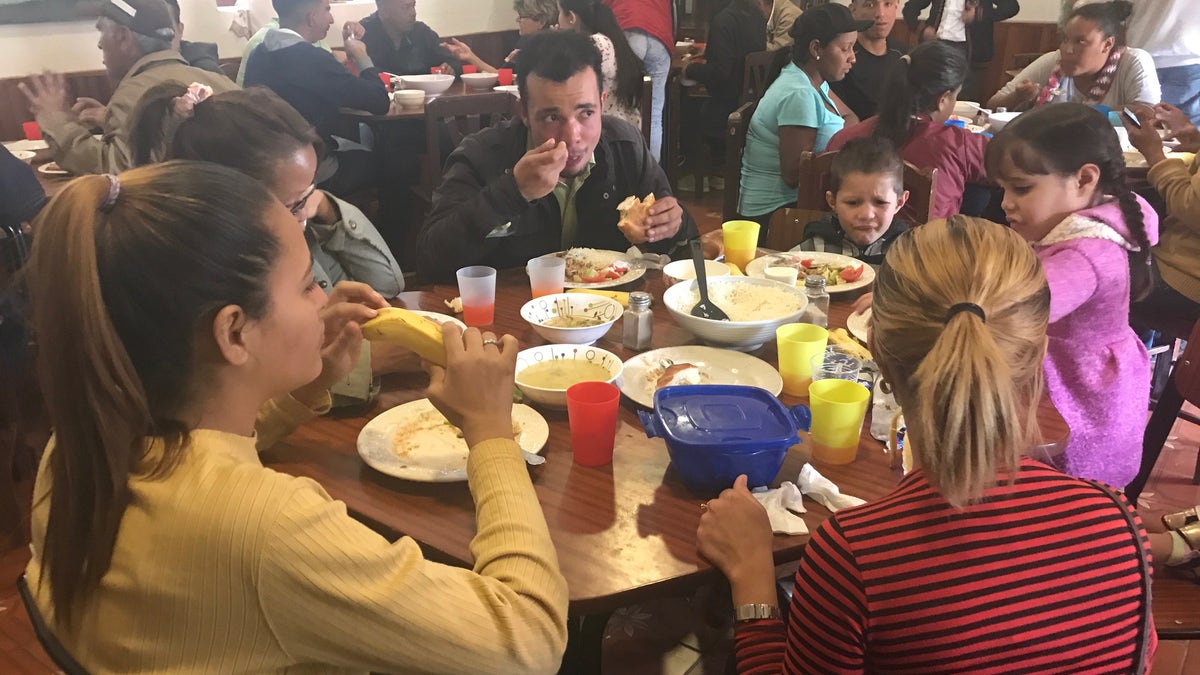
In several soup kitchens and shelters along the Colombia-Venezuela border, separate lines and dining areas have had to be set up to divide the poor locals from the Venezuelans as to avoid any contention. (Fox News/Hollie McKay)
The list of issues that Sen. Robert Menendez, the ranking Democrat on the Foreign Relations Committee, does not see eye-to-eye on with President Donald Trump is a long one.
But there is little that separates them when it comes to Venezuela’s socialist government and President Nicolas Maduro.
As tensions between the U.S. and Venezuela worsen, Menendez recently told Fox News he holds out hope Trump will consider bi-partisan efforts calling for Venezuelans in the U.S. to be eligible for Temporary Protected Status (TPS), a renewable humanitarian program that spares foreign nationals from deportation and allows them to work here if they are from a country deemed unsafe to return. Congress created TPS in 1990.
Maduro’s policies have helped further drive Venezuela – once one of Latin America’s most stable democracies – into social, political and economic chaos. More than two million Venezuelans have left the country, and many more are expected to continue the exodus.
“The president hasn’t been a big fan of TPS,” said Menendez, who introduced a bipartisan bill last month seeking the humanitarian relief for Venezuelans. “But he has largely been in sync with us on sanctioning the Maduro regime, and others within it.
“We thought there a good possibility – (Sen. Mark) Rubio is on the bill with me – where this might be the one areas where he would consider TPS…but in a truly temporary status.”
Venezuelans in the U.S. have been applying for political asylum in growing numbers in recent years. But obtaining TPS status – which requires demonstrating a fear of persecution based on race, religion, nationality, political opinion or membership in a particular social group – has become more difficult as the Trump administration vowed to tighten the program.
The president also took aim at TPS, moving to end it for immigrants from such countries as Nicaragua and El Salvador, among other places. Last year, a federal judge in California blocked the administration from ending TPS. The administration has appealed the ruling.
By most accounts, Venezuela is a country in freefall crisis. It has the highest murder rate in the world – 81 per 100,000 residents. Inflation has topped one million percent. Everything ranging from toilet paper to medicine is scarce. And it's becoming increasingly perilous for those in the country to criticize the government. In a pattern that took hold with the late president, Hugo Chavez, many prominent critics of the Maduro administration have been arrested and are languishing in jail.
Menendez said TPS would be more attainable than asylum for some Venezuelans. “At the end of the day, it’s a question of do they meet [the asylum requirements], do they have a credible fear of persecution in their personal case, not in the generic sense.”
Human Rights Watch and the Venezuelan American Bar Association also have called for TPS to be available to Venezuelans. And a petition to the White House by the Venezuelan American Bar Association has received 127.000 signatures.
Asked for a response to calls for TPS, Department of Homeland Security spokeswoman Katie Waldman declined to comment. But on the White House petition page, a response to the Venezuelan TPS request said: “The Secretary of Homeland Security is responsible for determining whether to grant TPS to eligible foreign nationals. The United States condemns the Maduro dictatorship and stands with the people of Venezuela in their quest to restore democracy to their country. Thank you, again, for contacting the White House.”
According to Human Rights Watch: “Governments in the Americas should develop a collective and uniform response to the exodus of people fleeing Venezuela. They should consider adopting a uniform temporary protection regime to afford security and legal status to Venezuelans seeking protection. Venezuela’s deepening crisis has triggered the largest migration flow of its kind in recent Latin American history.”
Meanwhile, a coalition that includes more than a dozen Latin American countries is deciding the next steps for handling Venezuela's deepening crisis, as Maduro enters a second term widely rejected as illegitimate. The so-called Lima Group met Friday in Peru's capital. The meeting came days before Maduro's Jan. 10 inauguration to a second, six-year term.
Argentina, Brazil, Colombia and Mexico are among the group's members. Some hardline countries propose withdrawing diplomats from Caracas. Venezuela's Foreign Minister Jorge Arreaza accused the coalition is taking orders from the U.S.
On Sunday, Maduro, who is to be sworn in on Thursday, tweeted that Venezuelans had validated his mandate by voting him in again last year. "To those who hope to break our will, make no mistake. Venezuela will be respected!" he said.
The U.S. State Department said over the weekend that the National Assembly, which opposes Maduro, is the "only legitimate and last remaining democratically elected institution that truly represents the will of the Venezuelan people."

